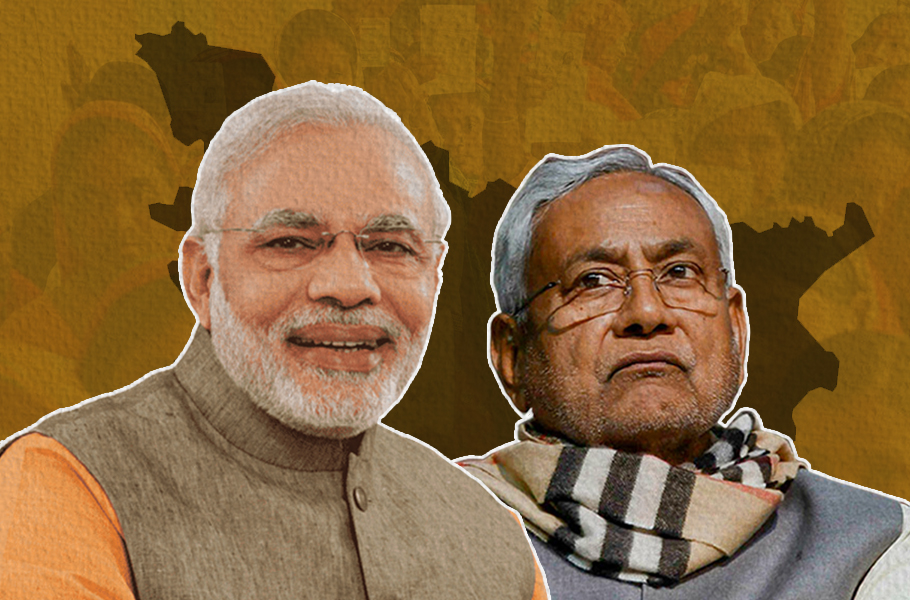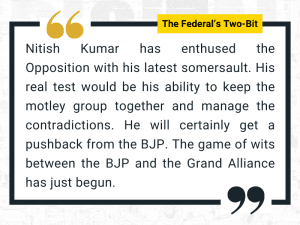
Bihar puts spoke in the wheel as BJP juggernaut rolls from state to state
Bihar, with one of the most politically aware electorates in the country, has been in the forefront of big political changes; the latest anti-BJP coalition looks formidable and could set the tone for the future

It is a bit early to conclude who is likely to benefit more from Nitish Kumar’s sudden exit from the NDA and forming a new government within 24 hours in Bihar — the BJP or the Grand Alliance.
On paper, the Grand Alliance certainly looks formidable, as the RJD, Congress and Left parties have come together to forge a joint front against the BJP, which, over the past few years, has emerged as an unbeatable election machine.
The new formation enjoys many advantages, ticking several boxes. It has the best social and ideological combination on its side. Dominant intermediate castes, the backward, most backward, the Dalits and the minorities have combined under this umbrella. The Left and even the Ultra Left have combined with the RJD and the Congress.
Also read: Without Nitish and JD(U), BJP has a tough road ahead in Bihar
The Alliance leadership can boast of the right blend of experience and youth, with Nitish at the helm and Tejashwi Yadav as his deputy. The BJP, now in the Opposition, can hardly claim any halo as it has been sharing power all these years and should be held equally responsible for acts of omission and commission of the administration.
Bihar sets the way
Bihar, with one of the most politically aware electorates in the country, has been in the forefront of big political changes. In the 1970s, if the JP movement, which overthrew an authoritarian regime helmed by Indira Gandhi at the Centre, originated in Bihar, a few years later, the same people received her with open arms when she virtually rode into their hearts on an elephant’s back to lend her voice to Dalits whose family members were massacred by upper caste landowners in Belchi.

In 1990, BJP leader LK Advani’s Rath Yatra that rolled through almost all of the Hindi heartland, raising passions on its way, looked unstoppable. But when it entered Bihar, it was halted on its tracks. It was then hailed as the victory of Mandal over Kamandal — in other words, the politics of social justice overriding that of Hindutva.
These are quotes from the past. The ground has since changed unrecognisably. Beyond sloganeering and political rhetoric, people are yearning for change — looking out for better administration, education and health facilities that have been eluding them all these years. Traditionally, Bihar has been less enthusiastic about communal politics, but it would certainly prioritise development.

The personal appeal and charisma of Narendra Modi has helped his party gain electorally in the state not only in Parliament but in the state Assembly as well. But much would depend on how the two sides — the BJP and the Grand Alliance — play their hand in the coming days.
A euphoric Opposition has claimed that the JD(U)’s breaking ranks with the BJP is an indication of a change in Indian politics. According to them, their resistance to “politics of intimidation” is gaining momentum.
Taking states, one by one
If the BJP went unabashedly after Congress-ruled states with its slogan of ‘Congress-mukt Bharat’’, it hasn’t been keeping quiet in states where it has been sharing turf and power with allies. If the Congress has lost power in half-a-dozen states since Modi assumed power in 2014, 11 allies of the NDA have deserted it in the same period.
Analysis: For NDA allies, Modi-Shah’s BJP is a far cry from Atal-Advani version
For the BJP, the battle for a state does not stop at elections. Uddhav Thackeray’s government is the seventh in a row where an elected government has collapsed after losing support through defections or rebellions with a liberal dose of help coming from outside in the form of central investigative agencies.
In all these cases, beyond ideologies, the political parties have focussed on self-preservation and survival. Wherever the BJP has sensed an opportunity, it has struck.
For instance, to get a foothold in Jammu and Kashmir, the BJP did not hesitate to tie up with its arch political enemy, the PDP. The party founded by Mufti Mohammed Sayeed won 28 seats, largely from the Kashmir Valley, in the 2014 Assembly elections. The BJP that ended up in the second position with 25 seats, largely from the Jammu region, joined Mufti’s cabinet in 2015.
But, three years later, it decided to pull the plug when the politics of the state wasn’t going its way. In 2019, it suspended the Assembly, scrapped Article 370 and divided the state into two Union Territories — J&K and Ladakh.
In Maharashtra, the fissures surfaced between the BJP and the Shiv Sena in 2014 over seat sharing in the Assembly elections. A confident BJP, after its enormous success in Parliamentary polls, demanded more seats. The Sena refused and briefly walked out of the alliance, accusing the BJP of betrayal. The two got together but could not get a clear majority, as the Assembly was hung. The Sena agreed to back the BJP’s Devendra Fadnavis as chief minister but later, in 2018, pulled out from the alliance.
The two again got together to jointly face the 2019 Parliamentary and Assembly elections. The coalition won but failed to come to an agreement on chief ministership. The Sena quit the alliance and formed a government with the help of the Congress and the NCP. Three years later, the government fell as rebels split the Sena vertically, with the breakaway faction forming a government backed by the BJP.
No friend of allies
After decades of association, in 2018, the TDP walked out of the NDA in Andhra Pradesh, accusing the BJP of failing to honour its commitment of extending special category status to the state. It tied up with the Congress for the Telangana Assembly elections but it proved disastrous. The Congress broke the alliance in 2019 and went alone to face the Andhra Assembly polls.
The Shiromani Akali Dal broke its 24-year-old alliance with BJP in 2020 for a number of reasons. The party found its clout reducing in the Centre as the BJP, in its second term, wasn’t receptive. It refused to share any seat with the Akalis for the Delhi Assembly polls. The last straw was a survey that indicated that the Akalis may lose the 2022 polls if they tied up with the BJP.
The Goa Forward Party, or GFP, tied up with the BJP reluctantly in 2017, as it had won four seats in the 21-member Assembly on an anti-BJP plank. It ended up supporting the BJP as the house was hung, though the Congress was the single largest party.
Finally, self-interest and self-preservation of political parties have been the overriding principle or ideology. Power seems to be the ultimate glue that either holds or separates them. The success or failure of the Grand Alliance would depend on the ability of its members to manage odds while ensuring their personal growth.

